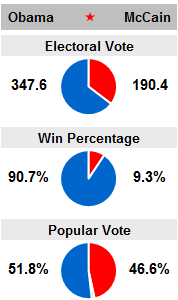High Corporate Tax Rate Is Misleading
IF YOU SAY SOMETHING long enough and loud enough, there's every chance people will come to believe it's true, especially if your opponents tire of rebuttals.
This time-honored political strategy has been working overtime of late, as Republican presidential hopefuls romance the richer Florida retirees with appeals for cuts in corporate taxes.
You may have heard: U.S. corporations face one of the highest income tax rates in the world, though the mention of "rate" is often enough excised, so that what comes through is the assertion that corporations pay too much in taxes. This is simply untrue if your basis for comparison is the developed world. The truth is that while the 35% corporate income tax rate is high indeed, the creativity and global reach of U.S. corporations make them among the most lightly levied.
Between 2000 and 2005, U.S. corporate taxes amounted to 2.2% of the GDP. The average for the 30 mostly rich member countries of the Organization for Economic Cooperation and Development was 3.4%.
Why the disparity given the high federal rate, which rises to 39% counting state taxes? Part of the answer is that big U.S. companies have become expert at hiding profits in tax havens overseas. And many of the smaller ones simply pass through their income to owners who then report it on their personal returns.
According to one analysis, if so much corporate income hadn't moved to the personal tax rolls over the last 20 years, U.S. corporate taxes would account for 3.2% of the GDP, still a bit below the OECD average. "Usage of pass-through forms of business organization can be viewed as a form of 'self-help' corporate tax integration," writes Peter R. Merrill, a partner at PricewaterhouseCoopers.
The income not squired away overseas or channeled to the personal returns still enjoys protection in the form of various tax breaks that depress the effective rate to 27%, according to the Treasury Department. Such breaks are expected to cost the Treasury $1.2 trillion over the next 10 years, reducing the corporate tax revenue by 25%.
Meanwhile, there's growing evidence that, despite the occasional crackdowns on especially creative tax accounting, routine corporate tax dodges are way up by historical standards, as multinationals play an increasingly profitable shell game.
According to one study, corporate taxable income has increasingly diverged from the (much higher) financial profits reported to shareholders. Another more recent analysis estimates that the effective corporate rate in the U.S. peaked at nearly 32% in 2000 but has declined to 25% by 2005.
There are so many ways to play the game: One can park valuable royalty-bearing intellectual property with foreign subsidiaries (hello, Microsoft (MSFT: 22.36*, -0.65, -2.82%)) or merely make sure that U.S. operations incur tax-deductible interest payments by borrowing money from cash-rich subsidiaries overseas. This is what's known in industry parlance as "income-shifting." It passes the time while one waits for the next U.S. tax holiday on repatriated overseas profits.
It doesn't take a rocket scientist to figure out the solution here: Drop the corporate income tax rate to, say, the Swedish socialist level of 28% to reduce the attraction of tax havens, while eliminating the broad exemptions and industry-specific perks that have turned our tax code into Swiss cheese feeding a regiment of millionaire tax lawyers. Make sure the total share of the tax bill sent to corporations either stays the same or goes up. In recent decades, corporate receipts have declined dramatically in relation to the highly regressive payroll taxes. It's long past time to reverse that trend, restoring work incentives to what they once were.
This is not a left/right issue, as one of the country's foremost corporate tax experts points out. Martin A. Sullivan writes that in Europe, it's the progressive governments that have often pushed for lower tax rates, applied more uniformly. Meanwhile, in Canada, it's the free-market Conservatives who've moved to eliminate tax-favored trusts in order to shore up the national tax base.
The choice is clear: a fairly enforced code that's deaf to special pleadings and thus capable of sustaining rates broadly competitive with those overseas, or else continued erosion of the tax base and tremendous waste from attempts to game the system, leading to various economic distortions and perversions. But this would not amount to a tax cut. And so I guess it wouldn't sell well in Boca Raton.




